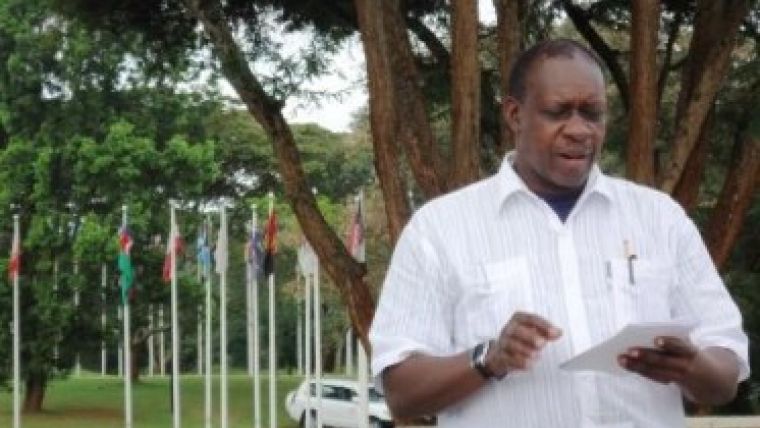Crowdsourcing: a Wake-up Call for Surveyors
GIM International Interviews Wafula Nabutola
Land forms the basis of food and shelter, and is one of the four production factors in the economy. Surveyors play a key role in designing and implementing spatial plans. In many cities in Africa, improper spatial planning results in situations of informality and completely uncontrolled development. As preparations are well underway for the FIG Working Week in Abuja, Nigeria, GIM International interviews Wafula Nabutola from Kenya, chair of the FIG Commission on Spatial Planning and Development. He provides an overview of the role of land administration in relation to spatial planning, and insights into the potential contribution the surveying profession can make on the African continent.
Spatial planning is based on information about people-to-land relationships. What is the current situation of land tenure, tenure security and land administration in Kenya?
Land tenure ought to be easy to understand. In Kenya, colonisation brought British and Indian land tenure and land laws. These were imposed, notwithstanding the existing communities’ land tenure. Over time, our various communities closed ranks to fight external aggression by the colonial masters. Hence, at the time of independence, we had about 25 pieces of legislation relating to land; some were even contradictory, a combination of English and Indian laws interspersed with African Customary Law. The cocktail of laws made land tenure difficult to understand and challenging to apply. Confusion reigned all along, even after independence, until the New Constitution of Kenya was enacted in 2010. The Constitution updated the 25 laws by combining some and obliterating others, leaving five pieces of legislation relating to public land, private land, trust land and communal land. These laws and the National Land Policy are meant to be administered by a National Land Commission. However, members of this Commission have not yet been appointed. There are forces of resistance, with too many vested interests. In fact, the original intent of the National Land Policy was severely watered down in Parliament: the new laws were crafted in such a way that they now only apply to public land, not the whole gamut of land tenure types.
What does this mean in practice?
Land tenure, land tenure security and land administration are the ideals envisioned in the National Land Policy of Kenya. The policy is meant to address the various historical and other social injustices dating back to colonial times. But a lot of damage and loss of integrity has created a phenomenon called ‘land grabbing’ – mainly by those with the right information from which to make decisions for the common good. But it should be remembered that this was not always the case.
What about informal areas and the role of slumlords in Kenyan cities?
There are informal settlements both in the urban areas, where they are referred to as ‘slums’, and rural areas, which are called ‘squatter settlements’. Slumlords are the equivalent of landlords in the formal sense, where every aspect of the relationship is well documented and all parties are privy to the terms and conditions laid out. The difference is that slumlords own the structures but not the land on which the structures stand. The land is usually owned by the government for a specific purpose, such as utilities or social services. Slumlords then become an intermediary between the slum dwellers and the government. They are agents by default rather than design. They keep their own registers, not in the sense of cadastre but nevertheless lists of tenants for administration purposes such as rent collecting...It is an administrative function for management records, turnover, outstanding rent payments and planning.
Considering informal tenures, do you see formalisation attempts?
The informal settlements get their clients from within, from rural areas and from other urban centres. If we could make the rural areas or wherever they come from more attractive, people would not need to leave in search of greener pastures elsewhere. Slum upgrading could work but it must be applied together with empowerment of the people, so they have a sense of livelihood and dignity. Civic education is needed. Policies, legislation and relevant implementation timelines are required urgently. Unfortunately, the policymakers are not directly affected and so see no sense of urgency; instead, they apply the concept of gradualism, which is most annoying. The Constitution of Kenya provides for decent shelter and adequate sanitation for all. But how long can citizens wait? It is good to see that the Kibera Slums in Nairobi are being upgraded with the help of the UN-HABITAT, World Bank and the Swedish International Development Agency. The inhabitants have hopes and expectations. Similar projects are in progress in other cities, and a slightly different model has been adopted in South Africa.
Does adverse possession work?
This has been common practice when people who have occupied or used land for a considerable period of time lay claim to it. It happens both in rural and urban areas, especially when land owners are absent. There have been dramatic occurrences in rural areas when squatters have invaded and occupied farms left by the colonials and allocated to – but never actually taken over by – locals, who have had the title transferred to them but not utilised the land themselves. In such cases, the labour force attempts to take over and sometimes succeeds, purely because of its size. Similar incidents are rampant in urban areas. When a registered owner cannot take possession, he sells the title to a third party, usually a developer, who then gets the police to evict the persons in adverse possession.
What is the general situation in Africa in terms of land administration, tenure security and colonial systems? Africa is a large continent with many different cultures and various approaches to land practice, some of which are very traditional like the Gha in Ghana, the Chiefs in Nigeria and Kenya. Different African communities had their own norms and practices spelling out the roles and responsibilities over land, but the common denominator was the lack of title deeds in the conventional way. The colonial system was based on the mistaken assumption that there was a vacuum in land administration in Africa.
Large land tracts are being acquired in Africa. Is this a positive development?
African agriculture can be more productive; it needs more inputs and better husbandry. Our land tenure system, in which the land parcels are becoming smaller as the population grows, is not sustainable. But smallholders have demonstrated resilience and are producing higher-quality coffee or tea by paying attention to detail. When competing at auctions, small-scale farmers command higher prices.
Foreign companies have invested heavily in floriculture, horticulture, sugar, tea and coffee, and they are offering much-needed employment. But we need policies that systematically transfer ownership to locals.
In Zimbabwe, we are seeing an Africanisation of farms. White farmers have been replaced by small farmers who produce the same quantity but feed many more mouths. The economy and livelihoods are expanding.
Qatar has asked Kenya to lease it 40,000 hectares of land to grow crops as part of a proposed package that would also see the Gulf state fund a new port on a popular tourist island. Saudi Arabia and the United Arab Emirates have both leased large tracts in the Sudan and Senegal. The sudden rush by foreign governments and companies to secure food supplies in Africa has some experts worried. Jacques Diouf from FAO recently spoke of the risk of neo-colonial agriculture. Many factors have to be considered, not least the terms and conditions of lease. Policies on technology transfer, capital, labour, market and infrastructure would help us see a clearer picture of the implications, but growing food here and sending it back to Qatar is not a very palatable proposition, especially when the indigenous people are starving. It leaves a sour taste in the mouths and souls of Kenyans.
Turning our thoughts to the profession, should crowdsourcing initiatives be supported and organised by surveyors?
Conventional surveying will always have a place in our society; there needs to be standards and benchmarks. However, crowdsourcing is a very real and important business idea which all surveyors ought to embrace. As surveyors, we tend to operate like lone rangers and as if we have a total monopoly of knowledge and information. This is false economy. This limits the scope for exploring new ideas and fresh ways of doing business, which is what every surveyor must seek to do. Crowdsourcing produces solutions from amateurs or volunteers; this is what I have been advocating here in Kenya, what I call “surveyors’ clinics”. Using data from OpenStreetMap and Google Earth makes mapping and enumeration more accurate and helps decision-making processes.
One more observation I would like to make is that, in urban areas, land readjustment is used as an approach. This has delivered proven results in many countries, mainly in Southeast Asia. In this method, the increased value of land is captured in order to finance the implementation of urban plans. We need to adopt similar approaches in Africa. UN-HABITAT and FIG are strongly supporting this approach, since it has a key role for surveyors. FIG is also involved in the development of unconventional approaches in land administration; I believe both are relevant for Africa, especially when combined with participatory approaches and crowdsourcing.
What is your message to professionals?
Professionals tend to be inward-looking, depriving themselves of opportunities in the process. For example, surveyors tend to stick to what they already know and rarely venture into new territories. Lateral thinking becomes the surveyors’ tool of trade. It is important for surveyors to understand that whatever professional activity they are conducting is first and foremost for the people, who are the primary consumers of their services. Surveyors tend to prioritise differently: land comes first and people second. Crowdsourcing would be ideal for uncovering what else is out there amongst our clients, most of whom are becoming increasingly smarter in matters which we long considered our special and exclusive domain.
The upcoming FIG Working Week in Abuja is a rare chance for African professionals in general, and African surveyors in particular, to showcase how far we, on this continent, have come since the early days. There are more of us and we need to hold our heads high and demonstrate that we are equal to the best on the planet, wherever they come from. Crowdsourcing is a brilliant wake-up call for us surveyors.
Are you optimistic about the future?
The future is bright: it holds more territory and openings to conquer, especially on the management side of surveying . It is not enough for us to think outside the box. Instead, we ought to remove the box altogether.
Wafula Nabutola is a surveyor and economist. He is the consultant-in-chief at MyRita Consultants and governor of the Kenya Private Sector Alliance (KEPSA). He has extensive private and public sector experience in policymaking, strategic planning, project management and corporate governance. He is involved in projects in education, health including maternal and child health, water and sanitation, and small-scale income-generating activities for the rural and urban poor. Wafula is chair of Commission 8, Spatial Planning and Development, of the International Federation of Surveyors (FIG). This commission’s activities include re-engineering megacities, drawing up planning policies, environmental management and planning and governance of informal settlements. Wafula is the first African national to serve as chair of a FIG Commission since its inception in Paris in 1878. Wafula and his wife Mwikali have served Kenya’s High Commissions in Canada and UK. He has a passion for imparting and sharing knowledge.

Value staying current with geomatics?
Stay on the map with our expertly curated newsletters.
We provide educational insights, industry updates, and inspiring stories to help you learn, grow, and reach your full potential in your field. Don't miss out - subscribe today and ensure you're always informed, educated, and inspired.
Choose your newsletter(s)
























